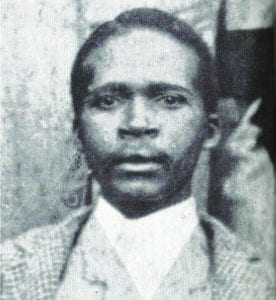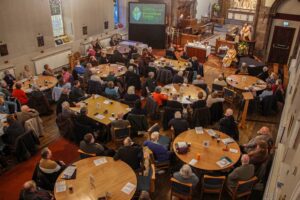In the Corona Chapel of Canterbury Cathedral, not far from the archbishop’s chair, is a nondescript installation commemorating martyrs of recent times, in particular those of the Anglican Communion. Among these is one little known in the wider Communion, but immensely significant in the memory of Christians, and Anglicans in particular, in southern and central Africa.
 Bernard Mizeki was born in what is now Mozambique in c. 1861, but found his way as a young man to Cape Town, where he was educated by the Society of St John the Evangelist (commonly known as the Cowley Fathers), and eventually became a Christian and was baptised. He was recruited by Bishop Knight-Bruce for the work of Christian mission that was just being initiated in central Africa. As well as his zeal for the Christian faith, his prodigious linguistic skills (he spoke at least eleven languages) would be a valuable asset to the Church as it entered unknown lands.
Bernard Mizeki was born in what is now Mozambique in c. 1861, but found his way as a young man to Cape Town, where he was educated by the Society of St John the Evangelist (commonly known as the Cowley Fathers), and eventually became a Christian and was baptised. He was recruited by Bishop Knight-Bruce for the work of Christian mission that was just being initiated in central Africa. As well as his zeal for the Christian faith, his prodigious linguistic skills (he spoke at least eleven languages) would be a valuable asset to the Church as it entered unknown lands.
As so often happened with Christian missions during the nineteenth century, and at other times, European imperialism complicated and compromised their efforts. In this case, it was the British South Africa Company of Cecil Rhodes (whose statue is about to be removed from Oriel College, Oxford), and his mercenaries, with the tacit compliance of the United Kingdom government which had entered what is now Zimbabwe, entered duplicitous contracts with local rulers, and exploited tensions between different population groups, with the view to seizing control of the land and its resources. When friction escalated into open warfare, Bernard Mizeki was recalled from his station for his own safety. Recognising that his converts were equally in peril, he refused to leave them, and was murdered about 18 June 1896.
It is important that we remember Bernard Mizeki, and many others like him, whose conversion to Christ, and work of Christian mission cost them their lives. But we need to recognise that there is more to it than that. Their Christian allegiance associated them with the forces of imperialism, and made them appear traitors to their own people. We are having to face in our day the reality that the European empires were far from benign, but exploitative and oppressive, and that this has enduring consequences. Slavery and the slave trade, which brought Britain immense wealth, blighted the lives of those enslaved and their families, and destabilised and impoverished communities haunted by traders and their agents. Similarly, exploitation of labour, extraction of minerals, and land deprivation for commodity agriculture created long-term poverty while bringing wealth to the colonial powers. The issues of racism we face in our society today are the legacy of this.
We rightly give thanks for the witness of Bernard Mizeki. But we need also to ask ourselves, Who killed him?
This reflection was written by the Rev Canon Dr Nicholas Taylor, Rector of St Aidan’s, Clarkston.


